Getting a well water filter system is one of the best ways to improve the water quality of your well water source. Well water can be very difficult to purify due to the presence of calcium & magnesium hard water minerals, as well as contaminants like tannins, iron and sulfur.
In this guide, we analysed home well water filtration systems using factors/metrics such as number of contaminants they remove, water flow rate, ease of installation and maintenance.
The best whole house water filter for well water in 2023 is the Springwell WS1 Water Filter System. It comes with offerings such as air injection oxidation for iron & sulfur removal, 12 – 20 GPM water flow rate and 4+ bathrooms capacity.
Iron, sulfur and manganese are the most common well water contaminants, and the Springwell WS1 removes them excellently. If you’re also looking to remove calcium and magnesium hard water minerals from your water, then you should consider getting a well water filter and water softener combo system, like the Springwell WSSS1 Filter & Softener Combo.
Also check our well water softener systems and acid neutralizer for well water articles for more product recommendations to help you remove hard water minerals and adjust the pH of your water.
Home Water Filtration Systems for Well Water Comparison Table
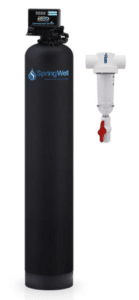
- Iron removal up to 7 PPM
- Hydrogen Sulfide removal up to 8 PPM
- Manganese removal up to 1 PPM
- Can deliver 12 GPM flow rate
- Springwell AIO System that used oxidation technology
- Daily backwash setting
- Bluetooth control
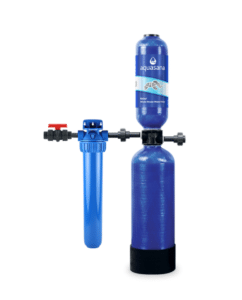
- A dual tank system
- Pre-filter and post-filters
- A well-designed shut-off valve
- UV light filter
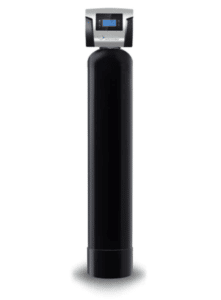
- Katalox bedding to remove iron, sulfur, and manganese
- Prevents the rotten egg smell
- Prevents staining
- This unit is best suited for well water with high amounts of iron
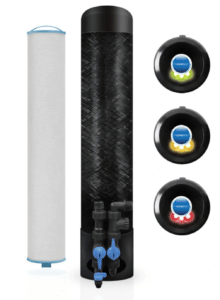
- 0.5-micron filter compatibility
- Digital Notification Head
- Removes lead and PFAS, PHOA, cysts
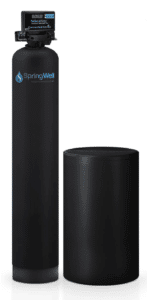
- Removes tannins and softens water
- Innovative Bluetooth Head
Best Water Filter for Well Water:
1. Springwell WS1 Whole House Well Water Filtration System
The WS1 is SpringWell’s flagship well water filtration system that has become one of the most popular and coveted water filters on the market. It is the ideal solution to orange and reddish tint caused by iron, or rotten egg smell due to excess sulfur.
The Springwell WS1 uses Air Injection Oxidation (AIO) technology to up to 8 PPM of hydrogen sulfide, 7 PPM of Iron, and 1 PPM of manganese. The water flows through the pocket of compressed air on the top of the tank to oxidise these contaminants. When the water flows into the media bed, oxidized contaminants stick to the media, leaving you with clear, odorless water.
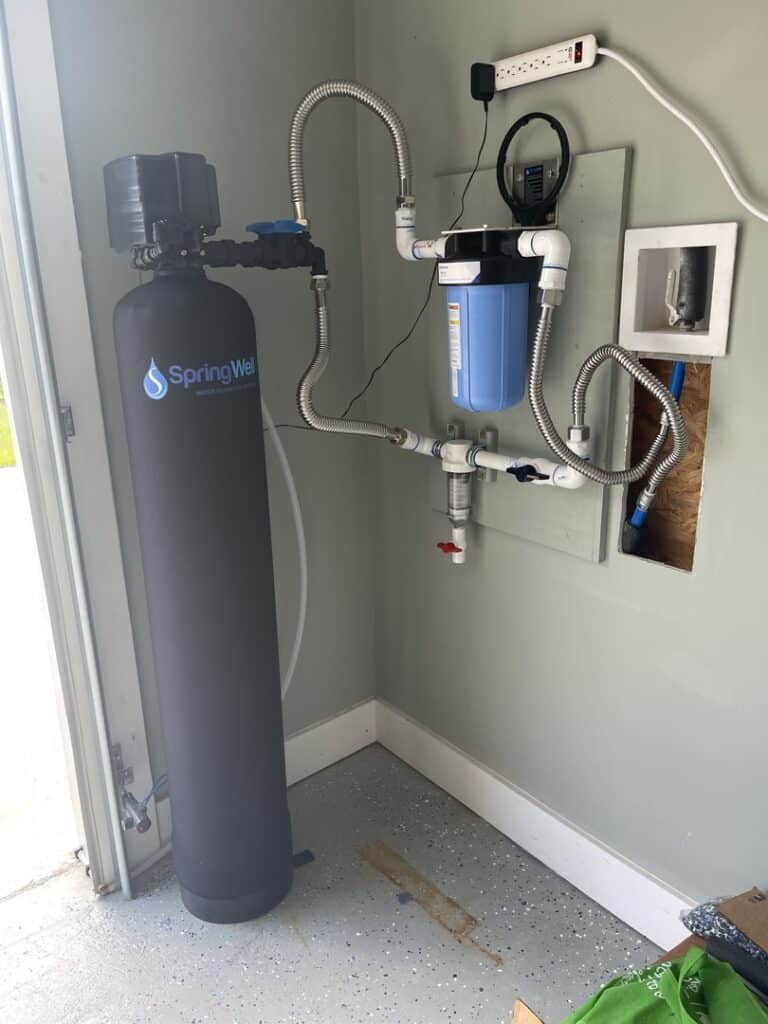
The media bed is then washed and drained automatically to get rid of oxidized contaminants.
You will be pleased to know the system itself does not require any maintenance. You just have to set your preferred settings and let it run. There is an option for daily backwashing so you can enjoy clean water at all times.
Thanks to Bluetooth technology, you can control the system settings through your phone or tablet. You can monitor and adjust backwash cycles, media regeneration, and valve settings easily. You can also see your water usage.
With a 12 GPM flow rate, the Springwell WS1 can deliver constant water pressure for large houses. The unit is built with NFS-certified components and comes with a lifetime warranty and a six-month grace period. However, the installation isn’t very easy, and you may have to hire a professional if you aren’t experienced with DIY plumbing projects.
If you feel that the system isn’t up to par with your needs, you can return the unit during those six months (provided it isn’t damaged or modified) for a refund. However, Springwell charges a 25% restocking fee, so you won’t get a full refund. Beware that shipping charges aren’t covered in the warranty. You’ll also have to pay for return shipping.
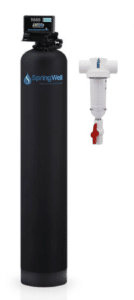
- Iron removal up to 7 PPM
- Hydrogen Sulfide removal up to 8 PPM
- Manganese removal up to 1 PPM
- Can deliver 12 GPM
- Springwell AIO System that used oxidation technology
- Daily backwash setting
- Bluetooth control
- Delivers 12 GPM (gallons per minute) at a water pressure of anything between 25 and 80 psi.
- Low maintenance: You can set the unit to flush all contaminants on a daily or weekly basis and adjust it through the app at any time
- It’s a quiet system that won’t make loud noises.
- A UV filter, RO drinking water filter, and salt-based softener upgrades you can purchase
- Doesn’t remove most contaminants
- It’s one of the most expensive systems we picked
- Upgrades to remove organic chemicals, bacteria, viruses, and other common contaminants are quite expensive.
- Installation can be hard if you aren’t well versed in DIY plumbing projects.
2. Aquasana Rhino Well Water Filter System With UV Filter
The Aquasana Rhino is another excellent well water treatment system that comes with a UV Filter to eliminate 99.99% of viruses and bacteria. Thanks to a combination of KDF, Activated Carbon, and UV light filters, it removes and reduces many contaminants, including but not limited to chlorine, herbicides, pesticides, lead, and sediment.
Once you install the system, water flows through the pre-filter, the dual tank, and the post-filter before it reaches the last step of filtration: the UV light.
Thanks to the dual tank system, water spends a long time flowing through the filters, allowing the filter media to grab more contaminants than single tank units. Most contaminants are eliminated by Carbon and KDF filters, and the UV light takes care of microorganisms, viruses, and bacteria before the water is distributed to the house.
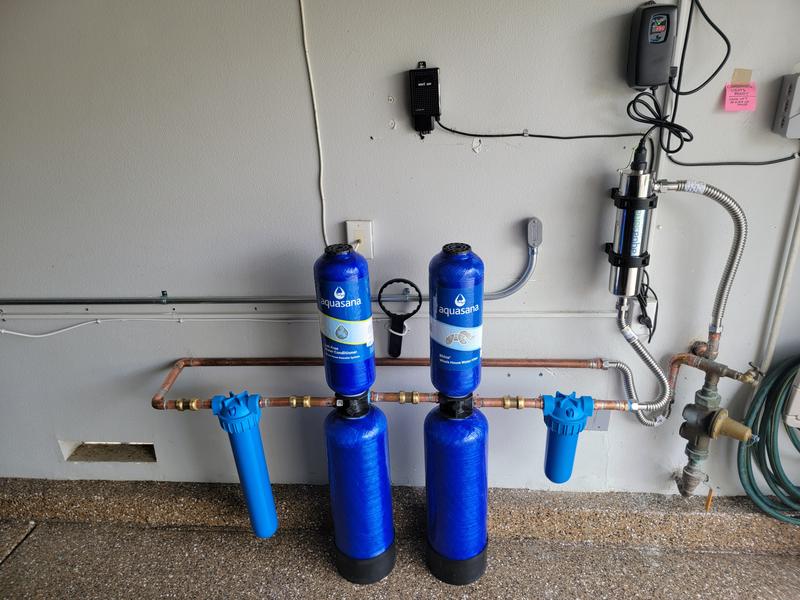
The dual tank design ensures maximum contaminant removal and makes the unit a lot less prone to clogging. Bacteriostatic media prohibits algae and bacteria growth in the system.
The Rhino delivers up to 14.7 GPM flow rate with constant water pressure.
If you choose to install the system on your own, you will need to order a Pro-Grade Install Kit ($100). However, the Aquasana Rhino can be hard to install by yourself if you don’t have experience in DIY plumbing projects. In that case, you may want to consider hiring a professional installer.
However, it’s important that you learn how to replace filters since the Rhino requires frequent filter replacements. You’ll need to replace the pre-filters every two months, the post-filters every six months, the UV lamp annually, and the tank every 5 years. While pre and post-filters aren’t very expensive, the UV lamp replacement can set you back around $100.
That said, the Rhino is the cheapest filtration system we picked. It offers a great cost/quality ratio, even if you have to change the UV lamp annually. It comes with a five-year warranty and a 90-day money-back guarantee. The company doesn’t pay for return shipping costs.
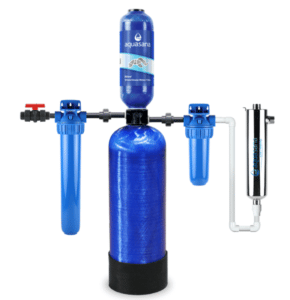
- A dual tank system
- Pre-filter and post-filters
- A well-designed shut-off valve
- UV light filter
- Removes or reduces a high number of contaminants
- Cost-effective
- Available water softener upgrade
- The filters have to be replaced regularly
- Installation can be challenging
3. SoftPro Iron Master Well Water Treatment System
The SoftPro Iron Master well water treatment system deserves its name due to its ability to remove up to 30 PPM of Iron, 5 PPM of Hydrogen Sulfide, and 7 PPM of Manganese. For comparison, Springwell WS1, another model we included in our review widely appreciated by customers, only removes 7 PPM of iron.
We can say that the SoftPro Iron Master is undoubtedly one of the best well water filtration system for iron, especially for water with very high iron concentration. It uses Air Injection Oxidation (AIO) technology to remove iron from water. The katalox bed traps iron and other particles and removes them from the system through backwash.
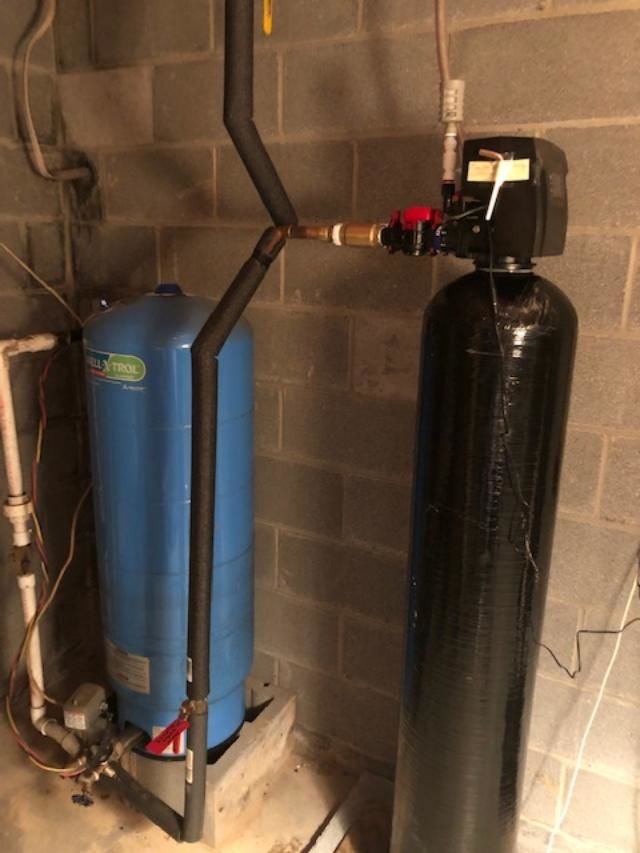
The SoftPro Iron Master water filter has an average lifespan of about 8 to 10 years. Its redox filter media is robust and can last for 5 to 10 years. This all depends on the levels of iron, manganese, and sulfur in the water that is passing through it.
The system operates at a flow rate of 6 -12 GPM based on the size of the tank.
You don’t have to replace filters often, as the media bedding will last anywhere from 3 to 10 years, depending on the amount of iron and other minerals in the water. Other parts, such as the connectors and piston, might need to be replaced in time due to wear and tear, but there is no regular schedule.
The unit comes with everything that you will need for installation and is easy to set up if you have experience with DIY plumbing projects. Otherwise, you should consider hiring a handyman for the installation process.

- Katalox bedding to remove iron, sulfur, and manganese
- Prevents the rotten egg smell
- Prevents staining
- This unit is best suited for well water with high amounts of iron
- The removal of 30 PPM of iron is hard to beat at any price point.
- The unit is IAPMO certified.
- Maintenance-free operation. It’s a set-and-forget unit. Once you install, you can kick back until it’s time to replace the system altogether.
- Efficient manganese and sulfur removal. With up to 7 PPM of manganese and up to 5 PPM of sulfur removal, the SoftPro IronMaster punches above its weight.
- It’s a more cost-effective option compared to WS1
- Doesn’t remove most contaminants
- Installation can be hard if you aren’t well versed in DIY plumbing projects
4. Springwell LCR Filter for Heavy Metals
The Springwell LCR-1 specializes in removing lead from well water. So, if you happen to be in an area where there are heavy metals present in the groundwater, you can count on this system to remove the contaminants.
Its 0.5-micron filters take care of non-soluble lead particles, while the Ionic Exchange technology ensures water-soluble lead is removed from the water. This system also removes PFAS, PFOA, cysts, and chlorine from your well water and reduces other harmful contaminants thanks to its 0.5-micron filters. The LCR is also capable of removing all giardia and crypto parasites that have been known to cause diarrhea.
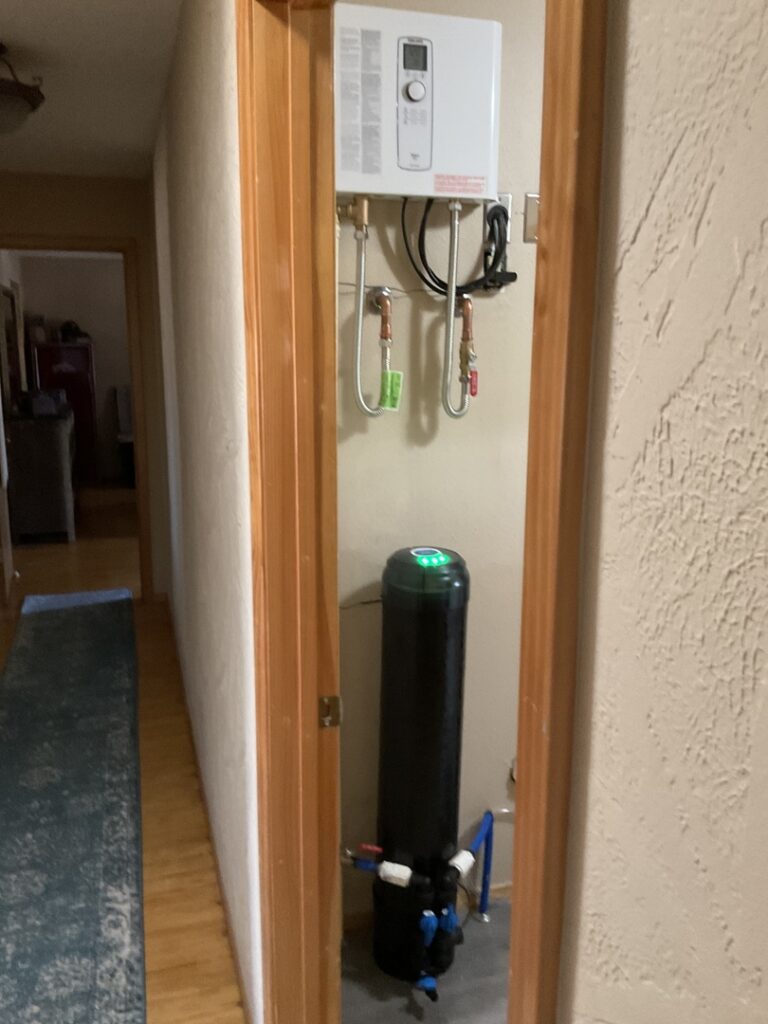
With a flow rate of 8 GPM, the Springwell LCR delivers a constant water pressure to your house. Set up is relatively easy if you have experience with DIY house projects.
The unit comes with a 6-month money-back guarantee and a lifetime warranty on tanks and valves. You’ll need to replace the pre-filter every 100,000 gallons or after 1 year of use.

- 0.5-micron filter compatibility
- Digital Notification Head
- Removes lead and PFAS, PHOA, cysts
- It’s one of the cheaper units on our list
- Successfully removes lead
- There is a significant change in the water taste
- There have been reports of carbon-like residue in water processed with the LCR
5. Springwell STR Filter/Softener for Tannins
The Springwell STR is a salt-based softener system that effectively removes tannins from water. It uses ion exchange technology to adsorb hard minerals and tannins in the water through resin bedding. Tannins can lead to water discoloration and leave stains on your faucets and clothes.
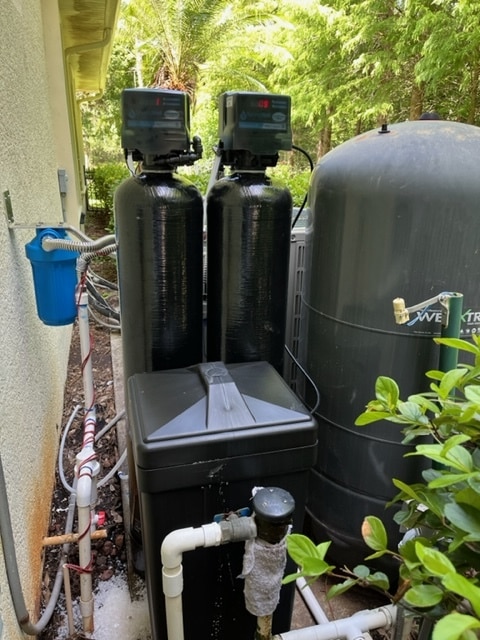
The system is fully Bluetooth compatible, which allows you to monitor it from your smart device. You can keep an eye on the backwash cycles, valve settings, and salt levels in the brine tank thanks to the smart app.
The Springwell STR also keeps track of your settings and forms a database of all added preferences. If everything is working as it should, you shouldn’t experience a drop in water pressure. It regularly performs backwashes, regenerates by itself, and rinses itself after use. Since it’s a salt-based softener, you’ll have to add salt to the tank regularly to ensure the system functions.
Installation is easy if you have experience with DIY house projects. Same as the LCR, the Springwell STR comes with a six-month money-back guarantee.

- Removes tannins and softens water
- Innovative Bluetooth Head
- Good for removing tannins
- Expensive
Our Review Criteria for Well Filtration Systems
We evaluated home well water filter systems based on the following criteria:
Contaminants Removed
The most important parameter is the filtration system’s ability to filter out different types of contaminants. We ranked how well the systems eliminate different contaminants, such as heavy metals (copper, cadmium, arsenic, lead, and chromium), micro-organisms, viruses, bacteria, organic chemicals, and substances such as pharmaceuticals, pesticides, paint, and disinfectants.
The winner in this category is, hands down, the Aquasana Rhino Water Filtration System. This unit is a jack of all trades, but the most impressive fact is that it manages to do everything that it’s supposed to at the highest possible level.
The Springwell WS1 came second, and it’s the best for removing iron, hydrogen sulfide, and manganese from water. While it’s not as efficient as SoftPro when it comes to removing high levels of iron, it’s one of the most well-reviewed and appreciated filters in the market.
Springwell LCR is the best for removing lead, PFAS, and PFOA (also known as forever plastics) in well water.
Although SoftPro Ironmaster came fourth, don’t be fooled by its humble rank. This unit can remove a staggering amount of iron (up to 30ppm), as well as hydrogen sulfide and manganese, from water without breaking a sweat.
Springwell STR removes tannins and hard minerals. It’s basically a water softener.
| Well Filtration Systems (Best to Worst) | Well water Contaminants Removed |
|---|---|
| Aquasana Rhino | 99.99% of bacteria and viruses. 97% of chlorine. Reduces harmful contaminants like lead, mercury, herbicides, pesticides, rust, silt, sediment, water soluble metals and industrial solvents, VOCs, and more. |
| Springwell WS1 | 7 PPM of Iron, up to 8 PPM of Hydrogen Sulfide, and 1 PPM of Manganese |
| Springwell LCR | Lead, PFAS, PFOA and treats cysts, chlorine, chloramine, and other harmful contaminants |
| SoftPro Iron Master | 30 PPM of Iron, 5 PPM of Hydrogen Sulfide, and 7 PPM of Manganese |
| Springwell STR | Tannins (dissolved organic materials in the water) and hard minerals |
Flow Rate
Water flow rate is the amount of water the system can handle at any given moment of time. It’s measured in gallons per minute (GPM).
While most houses use 2 or 3 GPM, the norm for whole-house filtration systems is 7 GPM. This is a solid number, and anything below that will likely decrease the water pressure. If you have multiple bathrooms and kitchens, you’ll appreciate a system with a high flow rate.
The Aquasana Rhino is capable of delivering constant water pressure levels of nearly 15 GPM.
That said, all our picks feature a flow rate higher than 7 GPM, which can comfortably support up to 4 bathrooms.
| Well Filtration Systems (Best to Worst) | Flow Rate |
|---|---|
| Aquasana Rhino | 14.7 GPM |
| Springwell WS1 | 12 GPM |
| SoftPro Iron Master | 12 GPM |
| Springwell LCR | 8 GPM |
| Springwell STR | 8 GPM |
Filtration Technology
We can’t exactly rank filtration technologies from best to worst since they eliminate different contaminants.
If you need to remove hard minerals from the water, a simple ion-exchange water softener device might be sufficient. But if you have a more serious issue, such as viruses and bacteria in your water, you’ll need different technology, like a UV filter.
Aquasana Rhino uses three different filtration methods, including a carbon filter, a KDF media filter, and a UV lamp.
Thanks to ionic-exchange technology and 0.5-micron filters, Springwell LCR removes lead and forever plastics from your well water.
Springwell WS1 and IronMaster both utilize air injection technology to remove iron and manganese from the water,
Finally, Springwell STR is an ion-exchange device, or more simply, a salt-based softener that removes hard minerals from water.
We’ll explain each filtration technology in more detail in the next section. For now, here is a handy list of each product and the filtration tech they use.
| Well Filtration Systems | Filtration Technology |
|---|---|
| Aquasana Rhino | Carbon + KDF + UV Filtering |
| Springwell LCR | 0.5 micron filter +Ionic Exchange |
| SoftPro Iron Master | Air Injection Oxidation (AIO) |
| Springwell WS1 | Air Injection Oxidation (AIO) |
| Springwell STR | Ion Exchange |
Ease of Installation
We also ranked each system according to the ease of installation.
Some of these systems are relatively easy to put together if you’re used to DIY projects, but a few are more complex, and you might need professional help to set up.
If you don’t have experience with plumbing projects, it might be a good idea to hire a professional.
Beware that some professionals may refuse to assemble the system in order to avoid voiding your warranty. You can ask your local plumbing store if they sell the unit you wish to purchase. If yes, they’ll be able to set it up for you quickly and efficiently.
Each unit on our list comes with a set of instructions to help you assemble the filter. You’ll also find helpful youtube videos for each product online.
While each unit comes with all the essential parts, you’ll still have to purchase connectors that fit your water pipes.
Maintenance Requirements
We ranked each system for maintenance requirements to give you an idea of how much effort (and money) you have to spend to keep your water filtration system working.
Our number one pick is Springwell WS1. It’s a set-and-go system that requires no maintenance. You can monitor it through Bluetooth via your phone.
Softpro Iron Master requires very little maintenance. The katalox media lasts 5 to 10 years (or 3 to 5 years in extreme circumstances). You might have to replace inexpensive parts, including the piston or seals, due to sediment infestation. The system doesn’t require regular maintenance.
Springwell LCR is similarly easy to use. You only need to change the pre-filter every 100,000 gallons or after 1 year of use.
Springwell STR features a Bluetooth mode that allows you to monitor the salt levels in the brine tank. Since it’s a salt-based softener, you need to add salt to the system regularly.
Finally, we have Aquasana Rhino, which needs more maintenance compared to other systems. Pre-filters should be replaced every two months, post-filters every six months, the UV lamp annually, and the tank every 5 years.
| Well Filtration Systems | Maintenance Requirements |
|---|---|
| Springwell WS1 | Minimal |
| SoftPro Iron Master | Minimal |
| Springwell LCR | Low |
| Springwell STR | Regular |
| Aquasana Rhino | Advanced |
Warranty
Warranty is an important metric, and we laid out the basics of each product for you. However, you must send your water for testing and contact the seller before purchasing a unit. Some units can’t be used in specific water conditions, and the manufacturer will let you know if their product is suitable for your water. Otherwise, you might damage the unit and lose your warranty.
All the products we listed offer a money-back guarantee after a period of use if you’re unsatisfied. Return shipping costs are not covered. The seller might keep 25% of the price as a restocking fee.
| Well Filtration Systems | Warranty |
|---|---|
| Springwell STR | 6 month money back guarantee & Lifetime limited warranty |
| Springwell WS1 | 6 month money back guarantee & Lifetime limited warranty |
| Springwell LCR | 6 month money back guarantee & Lifetime limited warranty |
| SoftPro Iron Master | 6 month money back guarantee & Lifetime warranty |
| Aquasana Rhino | 90 day money back guarantee & 5 year warranty |
Price
Of course, price is an important metric. We listed each unit’s base prices below, but keep in mind that almost every system offers different upgrades that might cost you extra if you decide to add more filtration technology to your unit.
Aquasana Rhino is a total winner when it comes to price/performance ratio. It’s cheaper than other systems and removes the most contaminants.
| Well Filtration Systems | Price |
|---|---|
| Aquasana Rhino | $1,399 |
| SoftPro Iron Master | $1,519 |
| Springwell LCR | $1,555 |
| Springwell WS1 | $2,204 |
| Springwell STR | $2,698 |
The Most Common Water Filtration Technologies
Naturally, we all want the best possible filter that we can afford, but which technology is the best? Well, the answer isn’t cut and dried. The best filtration technology is the one that best serves your needs
Let’s look at the most common water filtration technologies and see how they compare:
UV Filtering
The UV water filtering systems make use of special UV lamps that emit UV light at a certain wavelength that disrupts the DNA/RNA of microorganisms such as bacteria, viruses, or cysts.
UV light waves uses Germicidal Spectrum or Frequency, which is 254 nanometers (nm). As the water passes through the UV filter, bacteria and viruses are exposed to this frequency and destroyed.
UV water treatment units have risen in popularity because they are a surefire way of removing 99.99% of all harmful microorganisms. However, UV filtering only works when paired with pre-treatment solutions. Otherwise, viruses and bacteria can hide behind sediment and other particles. The water has to be completely clear for the system to work. Uv filters are often used as the last step in water treatment systems.
KDF Filters
KDF or Kinetic Degradation Fluxion filters are staples in water pre-treatment processes in both residential and industrial water filtration.
The filters feature zinc-copper alloys and produce an electrochemical reaction known as oxidation-reduction (redox). The process can remove or reduce lead, chlorine, mercury, iron, magnesium, hydrogen sulfide, chromium, calcium carbonate, fungi, algae, and bacteria from water.
The most common KDF filter on the market is the KDF 55, which is catered to fine granule mediums and reduces substances such as chlorine and soluble heavy metals.
Air Injection
Air injection filtration is a great water treatment approach that removes iron, sulfur, and manganese. As water flows through a tank equipped with an air chamber, the iron in the water oxidizes. When it reaches the media bed, oxidized iron is trapped in the media.
The same method is used when removing substances such as sulfur and manganese.
Granular Activated Carbon Filters
Granulated activated carbon filters (GAC) are one of the most utilized filters in pitcher filters and dispensers. You will find them in stock in your local supermarket and local retail shops.
Granulated activated carbon can adsorb certain chemicals in the water. It’s effective for removing VOCs, organic chemicals, chlorine, and hydrogen sulfide (sulfur or rotten eggs smell).
Carbon Block Filters
Carbon block filters are similar to GAC filters, but they’re more effective in filtering contaminants due to their compact structures (1 micron or less in size).
When water passes through the carbon block, carbon eliminates chemical contaminants. Sediment and other physical contaminants can’t pass through the block due to the small pore size.
Carbon block filters with 0.5 microns are well equipped to remove most contaminants found in well water, including chlorine, herbicides, pesticides, PFOS, pharmaceuticals, VOCs, and certain bacteria. Top-quality carbon filters can remove PFAS, mercury, asbestos, and radon from water.
You can expect a carbon block filter to remove anywhere from 50-60 contaminants from your water.
Reverse Osmosis
The products we choose don’t use Reverse Osmosis (RO) technology, but some of them offer an RO filter addition you can purchase.
RO systems have a 0.0001-micron size semi-permeable pores that removes dissolved solids, as well as bacteria and viruses, from the water.
RO systems can remove lead, sodium, chromium, copper, and chloride from water. They can reduce hard minerals like magnesium, calcium, and potassium as well as nitrate, arsenic, sulfate, fluoride, phosphorus, and radium.
Basic RO systems will successfully remove about 14 different contaminants on their own, but they really shine when they are combined with activated carbon filters. Together, they can remove about 70 contaminants – which is the pinnacle of water filtration at the moment. We also have a reverse osmosis system for well water article you can check out.
Frequently Asked Questions
Out of all the products we picked, the Aquasana Rhino removes and reduces the most contaminants, thanks to its triple carbon + KDF + UV light filters.
That said, you can also use a whole house RO system paired with a carbon block filter to eliminate the highest number of contaminants from water. Beware that RO systems have multiple disadvantages, though. You may not be able to use them in some states due to environmental regulations since they produce a lot of wastewater.
They also remove healthy minerals from the water, and you have to install a remineralizing filter to make up for the loss.
A new well filtration system can cost you $1,300- $2,500.
However, these are mostly whole-house systems that address specific problems.
You can also purchase affordable under-the-sink systems from $150 to $1,200.
Experience with DIY plumbing projects as well as a dedicated toolkit is very helpful when you’re installing a well filter. Each product we recommend in this article comes with instructions, and you can find multiple videos online to see how the installation works.
While the installation package for these systems usually includes all the important parts, in most cases, you’ll need to buy connectors and fittings that are the right size for your pipes. Other than that, you might require a wrench, some adhesive, tape, maybe a pipe cutter, a ladder, a screwdriver, and some drills.
Springwell (we recommend three different products from the company!), Aquasana, and Quality Water Treatment are all great brands. Other popular brands include 3M, GE Appliances, and Whirlpool.